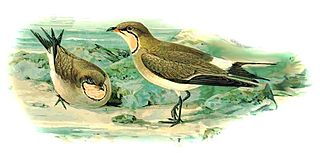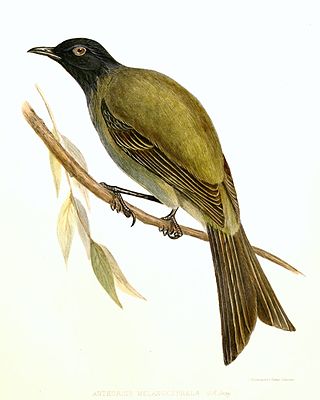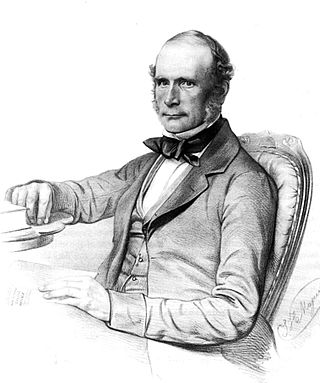
Hugh Edwin Strickland was an English geologist, ornithologist, naturalist and systematist. Through the British Association, he proposed a series of rules for the nomenclature of organisms in zoology, known as the Strickland Code, that was a precursor of later codes for nomenclature.

William John Swainson FLS, FRS, was an English ornithologist, malacologist, conchologist, entomologist, and artist.

John Gould was an English ornithologist who published monographs on birds, illustrated by plates produced by his wife, Elizabeth Gould, and several other artists, including Edward Lear, Henry Constantine Richter, Joseph Wolf and William Matthew Hart. He has been considered the father of bird study in Australia and the Gould League in Australia is named after him. His identification of the birds now nicknamed "Darwin's finches" played a role in the inception of Darwin's theory of evolution by natural selection. Gould's work is referenced in Charles Darwin's book, On the Origin of Species.
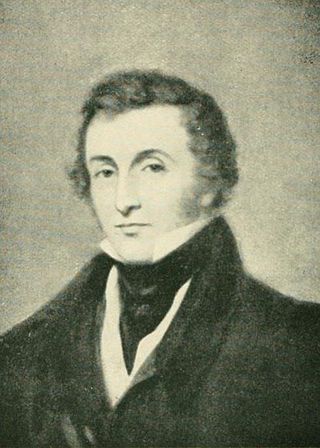
Sir William Jardine, 7th Baronet of Applegarth FRS FRSE FLS FSA was a Scottish naturalist. He is known for his editing of a long series of natural history books, The Naturalist's Library.

William Yarrell was an English zoologist, prolific writer, bookseller and naturalist admired by his contemporaries for his precise scientific work.

The russet sparrow, also called the cinnamon or cinnamon tree sparrow, is a passerine bird of the sparrow family Passeridae. A chunky little seed-eating bird with a thick bill, it has a body length of 14 to 15 cm (5.5–5.9 in). Its plumage is mainly warm rufous above and grey below. It exhibits sexual dimorphism, with the plumage of both sexes patterned similarly to that of the corresponding sex of house sparrow. Its vocalisations are sweet and musical chirps, which when strung together form a song.
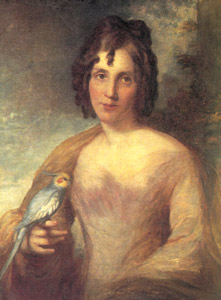
Elizabeth Gould,, was a British artist and illustrator at the forefront of the natural history movement. Elizabeth traveled and worked alongside her husband, naturalist and author John Gould. She produced illustrations and lithographs for ornithological works, including plates in Darwin's The Zoology of the Voyage of H.M.S. Beagle and the Goulds' seminal work The Birds of Australia. In total, Elizabeth is accredited to at least 650 works.

The yellow bishop, also known as Cape bishop, Cape widow or yellow-rumped widow, is a resident breeding bird species in Angola, Botswana, Burundi, Cameroon, Congo, Equatorial Guinea, Eswatini, Ethiopia, Kenya, Lesotho, Malawi, Mozambique, Nigeria, Rwanda, South Africa, South Sudan, Tanzania, Uganda, Zambia and Zimbabwe.
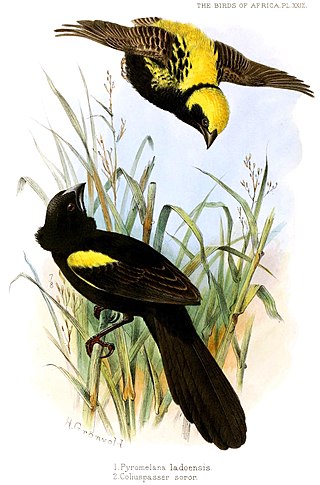
Euplectes is a genus of passerine bird in the weaver family, Ploceidae, that contains the bishops and widowbirds. They are all native to Africa south of the Sahara. It is believed that all birds in the genus are probably polygynous.

Illustrations of the Family of Psittacidae, or Parrots is an 1832 book containing 42 hand-coloured lithographs by Edward Lear. He produced 175 copies for sale to subscribers as a part-publication, which were later bound as a book. Lear started painting parrots in 1830 when he was 18 years old, and to get material for his book he studied live birds at the London Zoo and in private collections. The latter included those of Edward Smith Stanley, later 13th Earl of Derby, who had a large menagerie at Knowsley Hall, and Benjamin Leadbeater, a taxidermist and trader in specimens. Lear drew onto lithographic plates for printing by Charles Joseph Hullmandel, who was known for the quality of his reproductions of fine art.

The expedition members were:
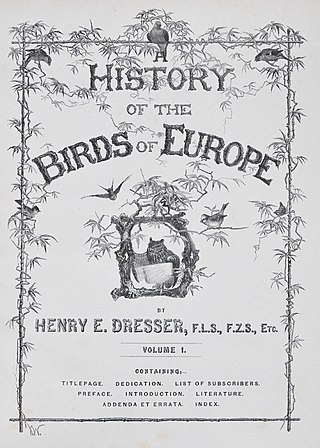
A History of the Birds of Europe, Including all the Species Inhabiting the Western Palearctic Region is a nine-volume ornithological book published in parts between 1871 and 1896. It was mainly written by Henry Eeles Dresser, although Richard Bowdler Sharpe co-authored the earlier volumes. It describes all the bird species reliably recorded in the wild in Europe and adjacent geographical areas with similar fauna, giving their worldwide distribution, variations in appearance and migratory movements.
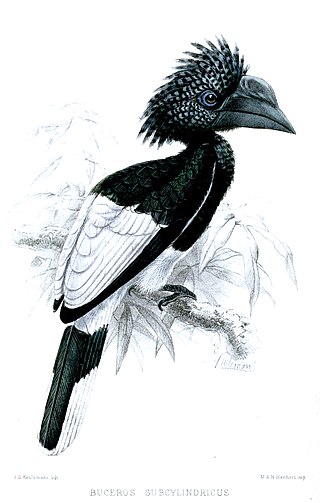
Birds described in 1870 include Recurve-billed bushbird, Beautiful woodpecker, Philepittidae, Cantorchilus semibadius, Chinese barbet, White-naped seedeater, Belem curassow,

A Century of Birds from the Himalaya Mountains was an ornithological book published by John Gould between 1830 & 1832.















